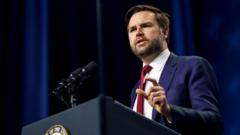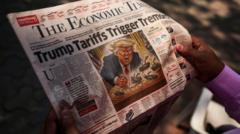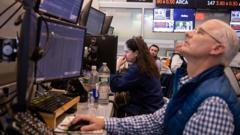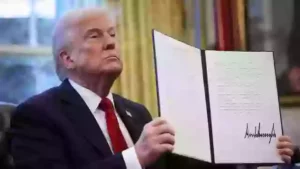Friedrich Merz's coalition seeks to send a strong message to both citizens and the European Union as it vows to stabilize the economy and address migration issues.
Germany's New Coalition Government: Merz Leads Conservatives in Strategic Alliance
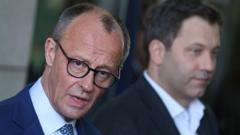
Germany's New Coalition Government: Merz Leads Conservatives in Strategic Alliance
Germany's conservatives and Social Democrats form a coalition to navigate economic challenges and bolster military readiness.
Germany's conservatives, led by Friedrich Merz, have successfully negotiated a coalition deal with the Social Democrats, allowing them to govern Europe's largest economy following the collapse of the previous government five months ago. Merz, 69, asserted that the agreement sends "a strong and clear signal" to both Germans and the EU, indicating the emergence of a government "capable of action."
The nation, already in the throes of recession, faced additional economic turbulence triggered by the trade tariffs imposed by US President Donald Trump. Merz conveyed a decisive message to Trump: "Germany is back on track," as he pledged to meet defense commitments and enhance economic competitiveness.
The coalition's formation comes after Merz's Christian Democrats clinched victory in the February federal elections amid growing pressure to end the political stalemate. Notably, his party finds itself trailing the far-right Alternative for Germany (AfD) in recent opinion polls, increasing the urgency to stabilize governance.
In announcing the coalition agreement, Merz emphasized a commitment to reform and stabilize Germany, specifically in the realms of migration, economy, and defense. He reassured the continent of Germany's reliability in navigating current challenges, pledging to revive the nation economically.
The path to consolidation is clear; the new parliament is expected to elect Merz as chancellor the week starting May 5, and his coalition boasts a comfortable 13-seat majority. Their recent reforms to Germany's stringent debt rules signal an eagerness to push through essential investments in defense and address infrastructure decay.
Part of the coalition agreement includes measures intended to significantly curb irregular migration and enforce stricter border controls, responding to voter concerns voiced during the February elections. The AfD criticized the plans, accusing Merz of yielding too much to the Social Democrats.
Addressing acute shortages in the military, the coalition is set to increase defense spending, though it will not reinstate conscription. Instead, Merz referred to a "Swedish model" of voluntary military service, hoping to expand the Bundeswehr through recruitments, while also committing to provide "comprehensive support" to Ukraine.
Maintaining a certain level of continuity, Boris Pistorius, the Social Democrat defense minister from the outgoing government, is expected to stay in his position in this coalition, which marks the fifth grand coalition (GroKo) since World War Two. Nonetheless, Merz's coalition partners have stressed that this coalition will deviate from previous governments.
Amidst the economic recession, critics like Sahra Wagenknecht from the left suggested that the coalition fails to adequately address Germany's economic crisis or the repercussions of the ongoing trade war, coining the term "Merzession" to highlight potential continued downturns.
Merz remains optimistic that the coalition deal will gain approval within their respective parties and anticipates commencing their administrative tasks in early May. Meanwhile, recent Ipsos polling positions Merz's conservatives second at 24% support, closely behind the AfD, whose co-leader Alice Weidel heralded the moment as unprecedented and predicted forthcoming political transformations.
The nation, already in the throes of recession, faced additional economic turbulence triggered by the trade tariffs imposed by US President Donald Trump. Merz conveyed a decisive message to Trump: "Germany is back on track," as he pledged to meet defense commitments and enhance economic competitiveness.
The coalition's formation comes after Merz's Christian Democrats clinched victory in the February federal elections amid growing pressure to end the political stalemate. Notably, his party finds itself trailing the far-right Alternative for Germany (AfD) in recent opinion polls, increasing the urgency to stabilize governance.
In announcing the coalition agreement, Merz emphasized a commitment to reform and stabilize Germany, specifically in the realms of migration, economy, and defense. He reassured the continent of Germany's reliability in navigating current challenges, pledging to revive the nation economically.
The path to consolidation is clear; the new parliament is expected to elect Merz as chancellor the week starting May 5, and his coalition boasts a comfortable 13-seat majority. Their recent reforms to Germany's stringent debt rules signal an eagerness to push through essential investments in defense and address infrastructure decay.
Part of the coalition agreement includes measures intended to significantly curb irregular migration and enforce stricter border controls, responding to voter concerns voiced during the February elections. The AfD criticized the plans, accusing Merz of yielding too much to the Social Democrats.
Addressing acute shortages in the military, the coalition is set to increase defense spending, though it will not reinstate conscription. Instead, Merz referred to a "Swedish model" of voluntary military service, hoping to expand the Bundeswehr through recruitments, while also committing to provide "comprehensive support" to Ukraine.
Maintaining a certain level of continuity, Boris Pistorius, the Social Democrat defense minister from the outgoing government, is expected to stay in his position in this coalition, which marks the fifth grand coalition (GroKo) since World War Two. Nonetheless, Merz's coalition partners have stressed that this coalition will deviate from previous governments.
Amidst the economic recession, critics like Sahra Wagenknecht from the left suggested that the coalition fails to adequately address Germany's economic crisis or the repercussions of the ongoing trade war, coining the term "Merzession" to highlight potential continued downturns.
Merz remains optimistic that the coalition deal will gain approval within their respective parties and anticipates commencing their administrative tasks in early May. Meanwhile, recent Ipsos polling positions Merz's conservatives second at 24% support, closely behind the AfD, whose co-leader Alice Weidel heralded the moment as unprecedented and predicted forthcoming political transformations.



